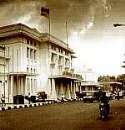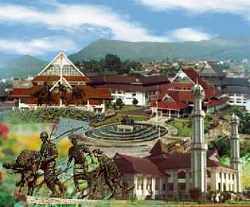|
There used to be a
country called Bandoeng consisting of 25 to 30 houses ("Aen een negrije genaemt
Bandoeng bestaende uijt 25 a 30 huysen") written by Julien de Silva in 1461 in
ancient Dutch. Julien de Silva an asian decent siding with Dutch was a mardjekr (a free
man, not a slave anymore). He was predicted to be the first man wandering around Bandung
which was still a dense forest at that time. Later on the Dutch called that region
"Negorij Bandoeng" or "West Oedjoeng Beroeng". |
A century
later, however, in 1741, it was recorded that Arie Top was the first white man who became
Bandung inhabitant. He was a corporal exiled by the Dutch Administration, even through he
was posted as military commander. Later on, he together with other three Dutch men who
came a year after him, became rich due to their succes in clearing the forest. Cultivating
the land and establishinga wood sawing enterprise. The succes of those for Dutch men
attracted other European adventurers to come to bet their fortune in the fertile region of
Bandung. |
Furthermore,
after a path way connecting Jakarta, Bogor, Cianjur and Bandung was established, many
newcomers come there, even more after Governor General Daendels gave an order to construct
"a pstal way" stretching from Anyer (Banten West Java) to Panarukan (East Java).
The construction began in 1809. |
 |
The history of Bandung regency begins at Karapyak or Bojongasih in
the Cikapundung riverside, near the Citarum river. Karapyak's name then changed to
Citeureup, |
|
Citeureup village is still exist by now in the
Dayeuhkolot area.The first regent is Wiraangunangun (1641-1670). In the Wiranatakusumah II
Era (1794-1829), the capital of Bandung moved from Karapyak to the Cikapundung riverside
(and at present it located at Alun-alun Bandung).This capitol moved by the instruction of
East Indische Governor General " Deandels " at Mei 25th 1810.The reason is
because he tought that this new capital has a good prospect for further development of
Priangan area. |
One
of the most progresive regent in the Bandung regency history was Wiranatakusumah IV, he is
the founder of Bandung's Master Plan called Negroij Bandung. On 1850 he build Pendopo of
Bandung Regency (now it became Mayor's House, in front of Alun-alun Bandung) and Masjid
Agung Bandung (Bandung's Grand Mosque). For his efforts he got an award from Dutch
Colonial Government. Since then the people of Bandung regency called him "Dalem
Bintang". This popular regent then replaced by Raden Adipati Kusumadilaga. |
In
the Kusumadilaga's era, the railroad entered bandung regency (May 17th 1884). The capital
development increase very fast, especially in the economic field. In the RAA
Martanegara's Era (1893-1918), the capital status changed to Gemeente (Town/Kotapraja) and
the first Mayor is Mr. B Coops). Since then, Bandung regency is separated from Bandung
City / Town. |

|
In the year 1955, Asia -
Africa Conference are arranged in Bandung. It was the first International conference since
Indonesian Independence. The conference take a place at Merdeka Building. The participants
from many countries in Asia and Africa are sleep at Savoy Homan Hotel, one of historical
buildings in Bandung. |
|
|
 |
In the Regent RH Lily Sumantri era, the capital of Bandung Regency
moved to Baleendah, near the first old capital of Bandung Regency.
But for some reasons it moved again to
Pamekaran Village at Soreang area. In the Regent HU Hatta D era, the governmental
centre for Bandung regency are completed. |
|


